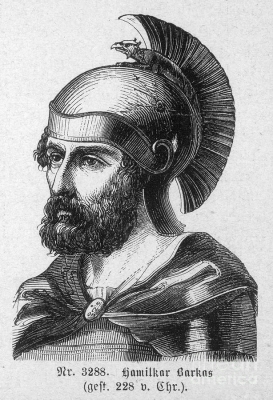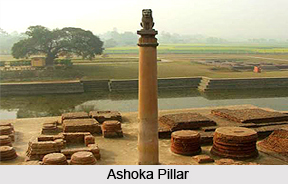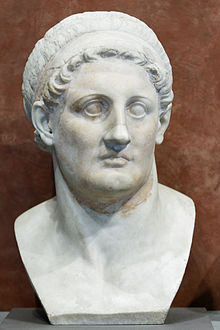Why Hannibal is considered one of the greatest warriors of all time?
By 264 BC, Rome was a force to be reckoned with. The only power in the region that could match that of the Romans was Carthage. Hannibal was a young Carthaginian general who won most of his battles by coming up with clever ideas. Once, while fighting at sea, Hannibal had his men dump barrels full of live snakes onto the deck of an enemy ship. The enemy had not expected Hannibal to do this. They weren’t prepared to fight snakes. Hannibal won that battle easily.
In 221 BC, Hannibal tried to attack Rome. Hannibal’s plan was to march 90,000 foot soldiers, 12,000 cavalry, and 37 elephants from Spain, through Gaul, over the Alps, into Italy, and then take Rome by force.
Continue reading "Why Hannibal is considered one of the greatest warriors of all time?"
 Hamilcar Barca was a daring, intelligent young Carthaginian general He was assigned the command in Sicily in 247 in the First Punic War. From mountain bases he made repeated raids on the Romans. However, the Carthaginians were defeated, and Hamilcar Barca negotiated the terms of the peace that led to Carthage’s withdrawal from Sicily. Later, the Carthaginian mercenaries revolted, but Hamilcar defeated them in 238. After that his popularity made him a virtual dictator. He then set out to conquer Spain as a new base against Rome, and had won considerable territory when he died. Hamilcar was probably the ablest general and statesman that Carthage ever had, until he was succeeded by his son, Hannibal.
Hamilcar Barca was a daring, intelligent young Carthaginian general He was assigned the command in Sicily in 247 in the First Punic War. From mountain bases he made repeated raids on the Romans. However, the Carthaginians were defeated, and Hamilcar Barca negotiated the terms of the peace that led to Carthage’s withdrawal from Sicily. Later, the Carthaginian mercenaries revolted, but Hamilcar defeated them in 238. After that his popularity made him a virtual dictator. He then set out to conquer Spain as a new base against Rome, and had won considerable territory when he died. Hamilcar was probably the ablest general and statesman that Carthage ever had, until he was succeeded by his son, Hannibal.
 Quintas Fabius Maximus was a Roman commander and politician during the Second Punic War. He knew from the reports of Roman commanders in the field that it would be difficult to defeat Rome’s arch enemy Hannibal, in open battle. So, Fabius decided to fight a war of delaying tactics. He dispatched various Roman forces into the hills of Italy to tail Hannibal as closely as possible, without engaging him in battle, knowing that the cavalry would be useless in the hills. These troops constantly cut of Hannibal’s supply lines, and harassed him incessantly and without mercy. Although these tactics were unpopular, and viewed as cowardly, they worked. Fabius would make his first and only offensive move of the war in 209 during his fifth consulship, when he captured the city of Tarentum, which Hannibal had captured three years before.
Quintas Fabius Maximus was a Roman commander and politician during the Second Punic War. He knew from the reports of Roman commanders in the field that it would be difficult to defeat Rome’s arch enemy Hannibal, in open battle. So, Fabius decided to fight a war of delaying tactics. He dispatched various Roman forces into the hills of Italy to tail Hannibal as closely as possible, without engaging him in battle, knowing that the cavalry would be useless in the hills. These troops constantly cut of Hannibal’s supply lines, and harassed him incessantly and without mercy. Although these tactics were unpopular, and viewed as cowardly, they worked. Fabius would make his first and only offensive move of the war in 209 during his fifth consulship, when he captured the city of Tarentum, which Hannibal had captured three years before.

 Being a far-sighted ruler, Ashoka was aware that if good habits were to be inculcated in his subjects, he would have to interact with them at their mental level. He knew that high philosophical thoughts and teaching would not be effective, and so he formulated a ‘code of conduct’ for his subjects.
Being a far-sighted ruler, Ashoka was aware that if good habits were to be inculcated in his subjects, he would have to interact with them at their mental level. He knew that high philosophical thoughts and teaching would not be effective, and so he formulated a ‘code of conduct’ for his subjects.

 Demetrius I was the King of Macedon. The son of Antigonus I, he proved himself a very able commander in his father’s wars, particularly against Ptolemy I. Though Ptolemy defeated him at Gaza in 312 BC, Demetrius was able to avenge his defeat later on. He defeated Ptolemy off Salamis, and took Cyprus. He besieged the city of Rhodes with great skill, and this earned him the name Poliorcetes or ‘besieger of cities’. The siege ended with a compromise peace, with Rhodes agreeing to ally herself with Antigonus against anyone other than Ptolemy.
Demetrius I was the King of Macedon. The son of Antigonus I, he proved himself a very able commander in his father’s wars, particularly against Ptolemy I. Though Ptolemy defeated him at Gaza in 312 BC, Demetrius was able to avenge his defeat later on. He defeated Ptolemy off Salamis, and took Cyprus. He besieged the city of Rhodes with great skill, and this earned him the name Poliorcetes or ‘besieger of cities’. The siege ended with a compromise peace, with Rhodes agreeing to ally herself with Antigonus against anyone other than Ptolemy.


 Chandragupta Maurya was the founder of the Maurya dynasty, which ruled Ancient India for about 140 years. His troops conquered one northern Indian kingdom after another, and claimed lands that stretched as far as west as Afghanistan. In this way, Chandragupta united Northern India under one ruler for the first time in history.
Chandragupta Maurya was the founder of the Maurya dynasty, which ruled Ancient India for about 140 years. His troops conquered one northern Indian kingdom after another, and claimed lands that stretched as far as west as Afghanistan. In this way, Chandragupta united Northern India under one ruler for the first time in history. Seleucus I was a daring Macedonian general who aided Alexander’s conquest of Persia and Northern India, and eventually united most of Alexander’s Asian empire, except for Palestine, under his own rule. After Alexander’s death, he became Governor of Babylonia, but was later forced to abandon Babylonia, and seek refuge with Ptolemy, Alexander’s closest friend. However, he did manage to reclaim Babylon, and after the truce of 311 BC, Seleucus was left as master of most Asian provinces, with the notable exception of Phoenicia and Palestine, which Ptolemy had annexed.
Seleucus I was a daring Macedonian general who aided Alexander’s conquest of Persia and Northern India, and eventually united most of Alexander’s Asian empire, except for Palestine, under his own rule. After Alexander’s death, he became Governor of Babylonia, but was later forced to abandon Babylonia, and seek refuge with Ptolemy, Alexander’s closest friend. However, he did manage to reclaim Babylon, and after the truce of 311 BC, Seleucus was left as master of most Asian provinces, with the notable exception of Phoenicia and Palestine, which Ptolemy had annexed. Ptolemy was a Macedonian general under Alexander the Great and founder of the Ptolemaic dynasty of Egypt. This family of fifteen kings - all of whom were named Ptolemy - reigned over Egypt for more than three hundred years.
Ptolemy was a Macedonian general under Alexander the Great and founder of the Ptolemaic dynasty of Egypt. This family of fifteen kings - all of whom were named Ptolemy - reigned over Egypt for more than three hundred years.
 Who has not heard of Alexander the Great? He was one of the most famous men in the history of the world. The son of King Philip II of Macedonia, Alexander grew up with a great respect for the Greeks and their culture. Alexander’s father had conquered most of the Greek city-states before Alexander came to power, including the city-state of Sparta. When Alexander became king, even though he allowed the Greeks to manage their own city-states, they fought him at every turn. The Greeks lost and Alexander brought all their outposts and colonies under his control as well. Alexander conquered other cultures in the Mediterranean rather easily, including Egypt. Before his death, he had built over 70 cities, and had conquered the entire known world in the Mediterranean region. His empire stretched all the way to the Indus River.
Who has not heard of Alexander the Great? He was one of the most famous men in the history of the world. The son of King Philip II of Macedonia, Alexander grew up with a great respect for the Greeks and their culture. Alexander’s father had conquered most of the Greek city-states before Alexander came to power, including the city-state of Sparta. When Alexander became king, even though he allowed the Greeks to manage their own city-states, they fought him at every turn. The Greeks lost and Alexander brought all their outposts and colonies under his control as well. Alexander conquered other cultures in the Mediterranean rather easily, including Egypt. Before his death, he had built over 70 cities, and had conquered the entire known world in the Mediterranean region. His empire stretched all the way to the Indus River.


 Xerxes was a King of the Persians who lived from 520 - 465 BC. When he came to the throne, he quelled a revolt in Egypt, and then he decided to attack Greece. He moved his massive army and a fleet of ships by land and sea, with the fleet following the army, along the coast. The army had to go through a steep mountain pass called Thermopylae, where they were held back by a much smaller Greek force. However, the Persians found another route over the mountains, and defeated the Greeks in this battle.
Xerxes was a King of the Persians who lived from 520 - 465 BC. When he came to the throne, he quelled a revolt in Egypt, and then he decided to attack Greece. He moved his massive army and a fleet of ships by land and sea, with the fleet following the army, along the coast. The army had to go through a steep mountain pass called Thermopylae, where they were held back by a much smaller Greek force. However, the Persians found another route over the mountains, and defeated the Greeks in this battle.